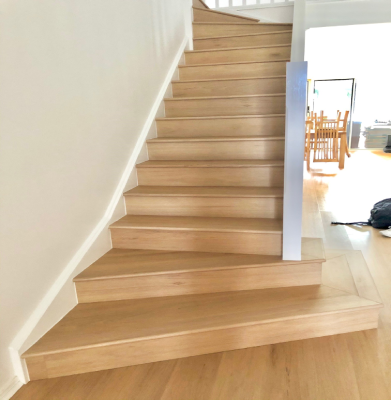One of the most common questions we hear from customers is: When it comes to hybrid vs vinyl flooring, what’s the best option?
The answer depends on several factors, including application, expansion, and how each feels underfoot. While both options offer fantastic durability and stunning aesthetics when installed correctly, understanding their differences will help you make the right decision for your home.
1. Application: Floating vs. Glue-Down Installation
Hybrid Flooring ✅
Hybrid flooring is a rigid floating floor that combines the best features of laminate and vinyl. Because it is installed as a floating floor, it does not require glue and is instead placed over an underlay, making it easier to install on most subfloors—including tiles!
✔ Suitable for a wide range of subfloors
✔ Can be installed over existing tiles (if the subfloor is level)
✔ No need for glue, making installation faster and easier
Vinyl Flooring ✅
Vinyl flooring is more flexible and is glued down directly to the subfloor. This means any imperfections in the subfloor will be noticeable if not rectified beforehand. More floor preparation may be needed, particularly when installing over tiles.
✔ Creates a seamless look due to glue-down application
✔ Works well in wet areas and high-moisture environments
✔ Requires a smooth and level subfloor for best results
2. Expansion: How the Flooring Reacts to Movement
Vinyl Flooring
Since vinyl planks are glued down, they do not require an expansion gap around the perimeter. This makes them ideal for:
- Homes with brick or concrete walls without skirting boards
- Situations where removing skirting or cabinetry kickboards is undesirable
Hybrid Flooring
Hybrid flooring requires an expansion gap around the entire perimeter of the flooring. This is typically covered by:
- Skirting boards
- Kickboards
- Trims or Scotia where necessary
While expansion gaps allow for natural movement, some customers prefer the seamless finish of vinyl flooring—especially in existing homes where adding trims may be noticeable.
3. Hybrid vs Vinyl Flooring Effect Underfoot: Comfort & Feel
The way a floor feels underfoot depends largely on the subfloor condition and installation method.
Hybrid Flooring
- May feel hollower than vinyl because it’s not glued down
- May have slight vertical movement, similar to other floating floors
- Offers more cushioning due to underlay
Vinyl Flooring
- Can feel more stable because it’s glued directly to the subfloor
- On an uneven subfloor, it may appear wavier than hybrid
- Provides a firm underfoot feel without movement
Hybrid vs Vinyl Flooring: Which Option is Best for You?
Choosing between hybrid and vinyl flooring comes down to your specific needs, home layout, and personal preferences. If you’re unsure, speaking to a flooring specialist in your home can help identify which option will work best.
✔ Need a floor that’s easier to install? Hybrid flooring is a great choice.
✔ Want a seamless, glue-down option? Vinyl plank flooring may be best.
✔ Concerned about subfloor imperfections? Hybrid can be more forgiving.
Get Expert Advice on Hybrid vs Vinyl Flooring!
Still unsure? Queensland Flooring Centre is here to help! Our team can guide you through the differences and recommend the best flooring for your space.
Visit our Coolum or Caloundra showrooms to see hybrid and vinyl flooring options in person or contact us for expert flooring advice today!





